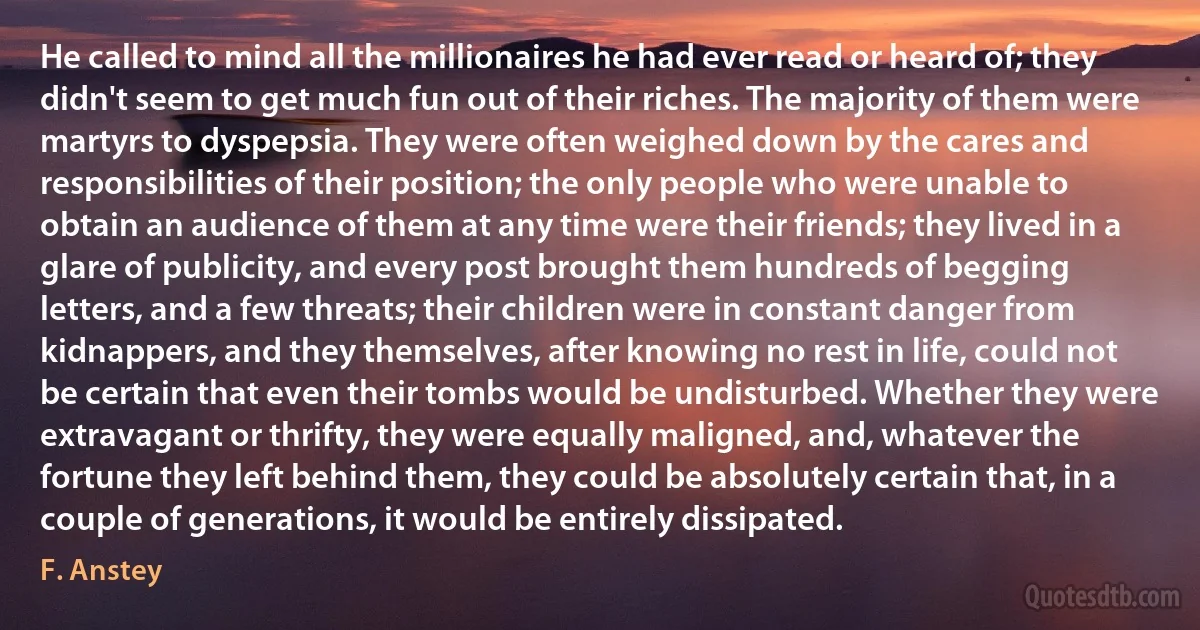
He called to mind all the millionaires he had ever read or heard of; they didn't seem to get much fun out of their riches. The majority of them were martyrs to dyspepsia. They were often weighed down by the cares and responsibilities of their position; the only people who were unable to obtain an audience of them at any time were their friends; they lived in a glare of publicity, and every post brought them hundreds of begging letters, and a few threats; their children were in constant danger from kidnappers, and they themselves, after knowing no rest in life, could not be certain that even their tombs would be undisturbed. Whether they were extravagant or thrifty, they were equally maligned, and, whatever the fortune they left behind them, they could be absolutely certain that, in a couple of generations, it would be entirely dissipated.
F. AnsteyRelated topics
begging behind certain children constant couple danger few fortune fun glare knowing left life mind people position read rest riches time whatever friendsRelated quotes
I cannot recall a time when American education was not in a "crisis." We have lived through Sputnik (when we were "falling behind the Russians"), through the era of "Johnny can't read," and through the upheavals of the Sixties. Now a good many books are telling us that the university is going to hell in several different directions at once. I believe that, at least in part, the crisis rhetoric has a structural explanation: since we do not have a national consensus on what success in higher education would consist of, no matter what happens, some sizable part of the population is going to regard the situation as a disaster. As with taxation and relations between the sexes, higher education is essentially and continuously contested territory. Given the history of that crisis rhetoric, one's natural response to the current cries of desperation might reasonably be one of boredom.

John Searle
Honor, justice and humanity call upon us to hold and to transmit to our posterity, that liberty, which we received from our ancestors. It is not our duty to leave wealth to our children; but it is our duty to leave liberty to them. No infamy, iniquity, or cruelty can exceed our own if we, born and educated in a country of freedom, entitled to its blessings and knowing their value, pusillanimously deserting the post assigned us by Divine Providence, surrender succeeding generations to a condition of wretchedness from which no human efforts, in all probability, will be sufficient to extricate them; the experience of all states mournfully demonstrating to us that when arbitrary power has been established over them, even the wisest and bravest nations that ever flourished have, in a few years, degenerated into abject and wretched vassals.

John Dickinson (delegate)
Sacredness is the essence of religion. You know, a great river may become polluted as it flows past a town, but if the pollution isn't too great, the river cleanses itself as it goes along, and within a few miles it is again clean, fresh, pure. Similarly, when once the mind comes upon this sacredness, then every act is a cleansing act. Through its very movement the mind is making itself innocent, and therefore it is not accumulating. A mind that has discovered this sacredness is in constant revolution - not economic or social revolution, but an inner revolution through which it is endlessly purifying itself. Its action is not based on some idea or formula. As the river, with a tremendous volume of water behind it, cleanses itself as it flows, so does the mind cleanse itself when once it has come upon this religious sacredness.

Jiddu Krishnamurti
I did not vote upon the Factory question. The fact is the Government are being whipped with a rod of their own pickling. They used the ten hours' cry, and all other cries, to get into power, and now they find themselves unable to lay the devil they raised for the destruction of the Whigs. The trickery of the Government was kept up till the time of Ashley's motion, in the confident expectation that he would be defeated by the Whigs and Free Traders...The Whigs very basely turned round upon their former opinions to spite the Tories. The only good result is that no Government or party will in future like to use the factory question for a cry...One other good effect may be that men like Graham and Peel will see the necessity of taking anchor upon some sound principles, as a refuge from the Socialist doctrines of the fools behind them.

Richard Cobden
For what advantage is it, that the world enjoys profound peace, if thou art at war with thyself? This then is the peace we should keep. If we have it, nothing from without will be able to harm us. And to this end the public peace contributes no little: whence it is said, ‘That we may lead a quiet and peaceable life.' But if any one is disturbed when there is quiet, he is a miserable creature. Seest thou that He speaks of this peace which I call the third (inner, ed.) kind? Therefore when he has said, ‘that we may lead a quiet and peaceable life,' he does not stop there, but adds ‘in all godliness and honesty.' But we cannot live in godliness and honesty, unless that peace be established. For when curious reasonings disturb our faith, what peace is there? or when spirits of uncleanness, what peace is there?

John Chrysostom
